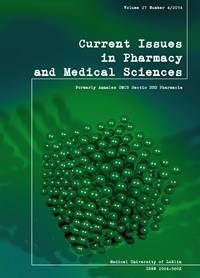The improvement of treatment efficacy of gastropathy associated with the use of nonsteroidal anti-inflammatory drugs in Helicobacter pylori-negative patients with osteoarthritis
DOI:
https://doi.org/10.1515/cipms-2015-0023Słowa kluczowe:
colonic microbiota, pantoprazole, probiotics, NSAID-gastropathy, NSAID-enteropathyAbstrakt
Among the more common side effects of osteoarthritis treatment are NSAID-gastropathy and NSAID-enteropathy. NSAIDs can cause direct injury to colon tissue and also impair synthesis of prostaglandins, reduce mucosal integrity, increase permeability and promote an influx of bacteria and toxins. Alterations in gastrointestinal permeability are considered as an initial step in the development of lesions of the gastric mucosa such as erosions and ulcers. The mechanisms underlying the ability of NSAIDs to cause ulceration in the stomach and proximal duodenum are well understood and this injury can be largely be prevented through suppression of gastric acid secretion. However, our work showed that 28-day administration of the anti-secretory preparation pantoprazole (20 mg 2 times per day) resulted in a statistically significant increase of dysbiosis. Monitoring of patients with osteoarthritis who used NSAIDs for more than three months showed that, in comparison to the situation before the beginning of treatment, changes in colonic microbiota were present. Multiprobiotic “Symbiter®acidophilic concentrated” introduced simultaneously with pantoprazole during 20 days prevented formation of dysbiotic changes and led to the quicker healing of gastric mucous healing, in comparison with patients who used only pantoprazole alone. Moreover, it brought about total healing of the gastric mucosa within 4 weeks from the beginning of treatment.
Bibliografia
1. Fossmark R., Johnsen G., Johanessen E.: Rebound acid hypersecretion after long-term inhibition of gastric acid secretion. Aliment Pharmacol Ther., 21, 2, 2005.
2. Lam E. et al.: Enhancement of gastric mucosal integrity by Lactobacillus rhamnosus GG. Life Sci., 80, 2007.
3. Muratoglu G. et al.: Protective effect of famotidine, omeprazole and melatonin against acetylsalicytic acid-induced gastric damage in rats. Dig Dis Sci., 46, 2001.
4. Senol A. et al. Effect of probiotics on aspirin-induced gastric mucosal lesions. Turk J Gastroenterol., 22, 1, 2011.
5. Syer S, Wallace J. Environmental and NSAID-enteropathy: dysbiosis as a common factor. Curr Gastroenterol Rep., 16, 2014
6. Wallace J. NSAID gastropathy and enteropathy: distinct pathogenesis likely necessitates distinct prevention strategies. Br J Pharmacol., 165, 2012.
Pobrania
Opublikowane
Numer
Dział
Licencja
Prawa autorskie (c) 2015 Autorzy

Praca jest udostępniana na licencji Creative Commons Attribution-NonCommercial-NoDerivatives 3.0 Unported License.


